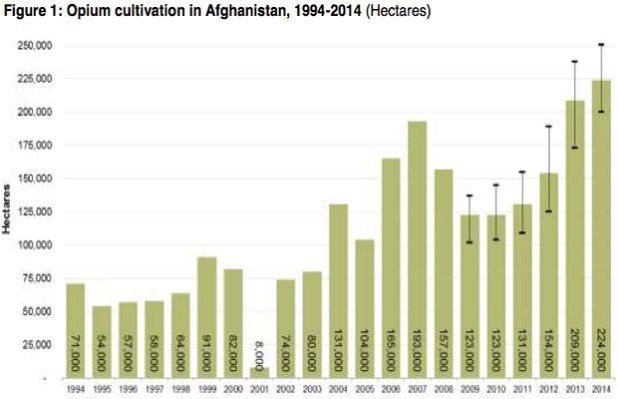How the War on Drugs defeated the War on Terror in Afghanistan
Afghanistan has cornered the global market in opium production, producing 90% of the world's opium on 780 square miles of opium fields.
Meanwhile, the Afghan army is barely holding on against a sustained Taliban insurgency that threatens to bring down the government.
The other week, a senior Afghan army general was busted for smuggling 44 pounds of heroin in his car.
These three items are all directly related.

Let's start with the condition of the Afghan army and our losing War on Terror.
after a casualty rate last year that the previous American commander called unsustainable, the numbers this year are even worse: up more than 50 percent compared with the first six months of 2014. About 4,100 Afghan soldiers and police officers have been killed, and about 7,800 wounded, according to statistics provided by an official with the American-led coalition here.
Up 50% from "unsustainable" is not a good thing.
Desertions are such a problem that most soldiers are forbidden from going home. There have been cases of soldiers shooting themselves just so that they can leave their besieged base.
Things have gotten so bad that Obama's revised timetable for withdrawing from Afghanistan may slip again.
“We are in a passive defense mode — we are not chasing the enemy,” said a retired Afghan lieutenant general, Abdul Hadi Khalid. “Units get surrounded, and we don’t send them support, so they are killed.”
He described consequences of mounting casualties as “really grave,” undermining the confidence of the security forces and the Afghan public. “It will turn into a subversive war that benefits the enemy,” he added.
After 14 years of war and occupation, how can we have managed to achieve so little? The answer to that question lies in our secondary goal in Afghanistan - the War on Drugs.
For example, U.S. drug policy in Afghanistan has led to the cartelization of the opium trade. By prohibiting the industry, smaller producers, discouraged by the possibility of fines, jail time or other punishments, exit the market. Those who remain were those who can afford to do business and take the risk of engaging in illegal activity –namely, the Taliban. As the United States incentivized the Afghan government to crack down on opium, local officials targeted small operations as opposed to large ones, leaving the Taliban-affiliated producers relatively unscathed and stronger than ever.
In addition, U.S. drug policies in Afghanistan have effectively driven ordinary citizens toward the insurgency as opposed to away from it. According to one estimate, the opium economy in Afghanistan provides over 400,000 jobs to Afghan citizens. Overnight, thousands of Afghanis became criminals. The Taliban, recognizing that the livelihoods of many were in jeopardy, offered to protect opium producers from, and actively retaliate against, U.S. eradication efforts in exchange for cash or a share of the opium.
In retrospect it is perfectly obvious that this would happen. Of course opium growers were going to turn to someone strong enough to protect their crops, and that someone would be the Taliban. The Taliban would then take a fee to fund their war.
So if you were wondering why the Taliban never seem to run out of bullets and bombs, look no further than the War on Drugs.
Meanwhile, heroin deaths in the United States has quadrupled since 2002.
$8.4 billion in taxpayer funds have been invested in counternarcotics programs in Afghanistan.
The U.S. has spent more than $110 billion on Afghanistan’s reconstruction, which, adjusted for inflation, is worth more than the entire Marshall Plan after World War II.
The huge increase in opium production in Afghanistan has also had a secondary effect - epidemic corruption in the Afghanistan government.
Corruption is so bad that Ret. Gen. John Allen, the former commander of U.S. and NATO forces in Afghanistan, said that corruption is worse than the Taliban.
"While the Afghan National Army will battle your nation's foes and, in that context, battle the Taliban, the battle for Afghanistan — the real fight — will be won by righteous law enforcement, a functioning judiciary and an unambiguous commitment to the rule of law," Allen said....
"If we don't take advantage of this opportunity and get serious about corruption right now, we are putting all of the fragile gains that we have achieved in this — our longest war — at risk of failure."
For instance, the former anti-corruption tsar spent time in prison for dealing heroin in Las Vegas.
If there was some progress being made against the corruption there might be some hope, but according to last November's report things are getting worse.
"It's getting worse.… Significantly worse," John Sopko, the special inspector general for Afghanistan reconstruction, told reporters at a breakfast roundtable. "Corruption is not only feeding insurgency, it's feeding a number of corrupt officials."
The corruption has also leaked into tax collection, or lack there of, in which tax revenue will miss by 20% this year, leaving the international community to pick up a third of the Afghan government budget, otherwise the Afghan government troops will not get paid.

